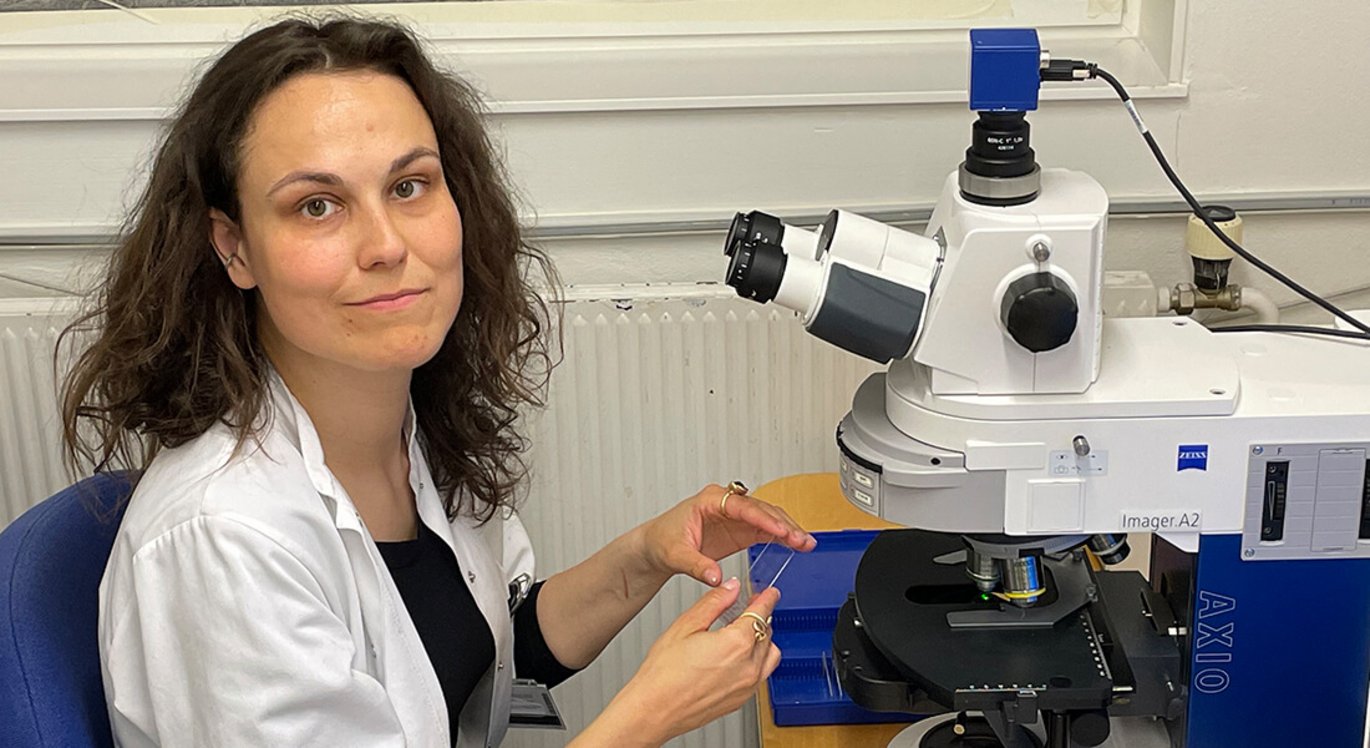New Group Leader: “I’d like to expand the horizon of affective neuroscience and how we study the brain”
For Anna Mathia Klawonn, knowledge is in constant motion, and to attain, it requires both persistence, luck, and a little bit of rebelliousness. Now, she brings all her curiosity to DANDRITE and Aarhus University as the new group leader starting in January 2024.

"Sapere Aude - Dare to Know"
The immortalized quote from Enlightenment thinker Immanuel Kant in 1784 becomes highly relevant when first encountering Anna Mathia Klawonn.
For her, there are no questions too big to explore and no talents too difficult to attain.
Raised in a family with generations of humanists, a father who was a philosophy professor, and a mother who was a high school teacher, art, psychology and philosophy, and the big questions about life filled the dinner table conversations:
"The discussions between my mom and dad were often about the fabric of what is human, and I would have long conversations with my father about the big questions, like whether there is a soul, and what consciousness is. So, I think this has influenced me greatly, this interest in the big questions of life," Anna explains.
With her great thirst for knowledge, Anna was attracted to many academic branches, and she even spend some time studying political science.
Discovering the universe in the universe
However, the dream that persisted throughout her childhood was to become an astrophysicist and learn about the interconnectedness of the universe. Until a biology teacher introduced her to another universe - the brain:
"I was lucky to meet some extremely inspiring teachers on my path. In particular, my high school biology teacher, Jørgen Lobedanz, made a great effort and brought his pupils to University Lectures. Here, I met Professors Helle Waagepetersen and Arne Schousboe, they united the individual pieces of neurobiology and cellular chemistry, and gave a unified insight into the complexity of the brain, and for me, that was a very defining moment. I think it was the moment I realized the brain is a universe in itself."
Already in her first year as a student of biochemistry and molecular biology, she dedicated herself to do research, not letting an inflexible Danish education structure stand in her way. As one of the very few, she received a 1-year research scholarship as only a bachelor's student and had no intention of following the traditional path through the system:
"I might have bent the rules a bit. I found every possible way to do science. My supervisor wanted me to do the classical master's, but I just knew I wanted more time in the lab doing research."
So, Anna spend three years in the lab during her bachelors and subsequently travelled to Linköping University in Sweden for multiple research fellowships and a PhD in neuroscience exploring the molecular mechanisms of reward and aversion.
In the Engblom lab at Linköping University, Anna made some groundbreaking discoveries. She was part of uncovering a complete molecular signaling route from the peripheral Immune-System across the blood-brain-barrier to the reward circuits of the Brain, responsible for signaling negative emotional states during sickness, and elucidated how the Immune-cells of the brain can cause depression.
“Essentially, we found the signaling mechanisms and neurocircuitry responsible for why being sick feels bad, which has strong implications for why so many inflammatory diseases are linked to affective neuropathology, like depression’.
Anna’s time in Sweden working with the neuronal circuits of affect and motivation led her to pursue a postdoc with the renowned professor Robert C. Malenka at Stanford University.
“Working for Rob was a dream come true. Rob is at the forefront of deciphering the complexity of reward neurocircuitry and since the first time I read his articles, I knew I wanted to work for him. I really wanted to be where the field was expanding and to learn from the best”.
Ready to expand the horizon
On January 1, 2024, she is embarking on a new chapter in her research career, moving from a group leader position at the University of Copenhagen to DANDRITE and Aarhus University.
For her, it means not only a new residence but also new research areas she wants to explore:
"I want to break with predefined hypothesis and dogma, to use unbiased approaches. I want to say we have this disease model for inflammatory disease, whether it is changing affective state or inducing neurodegeneration, let us look at it anew and not be colored by our previous knowledge. Instead let's do whole-brain mapping, let's look at cellular and genetic activity maps. Let’s look at microglia, astrocytes and neurons, where are the patterns, and how do these interconnects, then let’s go in and investigate these connections and patterns of communication and see if something new comes up."
If one can imagine being part of Anna's lab, she doesn't hide the fact that it's a huge advantage if you are ready to dig deep and bring a good dose of hunger for knowledge. In return, you get a leader who loves everything related to science and has a high energy level.
“We must remember that science in its daily form is hard practical work to find answers to specific scientific questions, and that on the path to knowledge there are both grand solutions and dead ends. But at the end of the day this is a lot of fun, because we are the lucky ones, who get to ask questions about the brain and see what answers nature has for us,” Anna states and adds:
“I hope that I too - like the teachers I was lucky to meet on my path - will get to inspire and help my students to develop as scientists and to uncover new aspects of the brain”.
